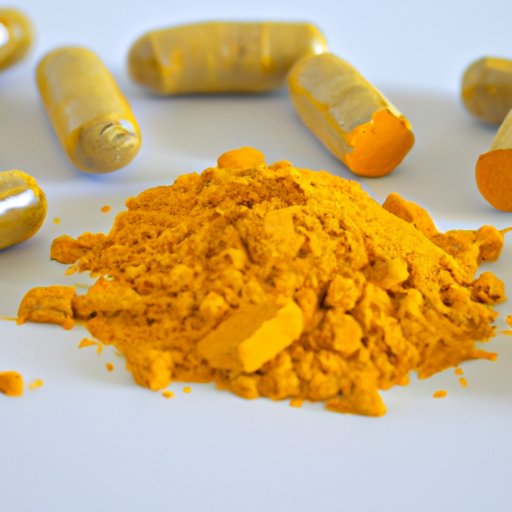Introduction
Turmeric is a popular spice with many potential health benefits for humans, but did you know that it can be beneficial for dogs too? This article will explore the potential benefits of turmeric for dogs, how much turmeric is safe for your pup, and ways to use turmeric to improve your dog’s health.

Overview of Benefits of Turmeric for Dogs
Turmeric is an ancient spice derived from the root of the Curcuma longa plant, which is native to India and Southeast Asia. It has been used in Ayurvedic medicine for centuries and is known for its anti-inflammatory and antioxidant properties. In recent years, researchers have studied the potential health benefits of turmeric for humans and animals alike. Studies suggest that adding turmeric to your pet’s diet can help combat inflammation and oxidative damage, both of which are linked to a variety of diseases.

Exploring the Benefits of Giving Turmeric to Dogs
The main active ingredient in turmeric is curcumin, which is responsible for its yellowish-orange color. Curcumin has powerful anti-inflammatory and antioxidant effects, and studies suggest that it may help reduce inflammation in dogs. Inflammation is a normal immune response that helps the body fight off infection and heal itself. However, chronic inflammation can lead to a variety of health problems, including arthritis, allergies, and digestive issues. By reducing inflammation, turmeric may help reduce some of the symptoms associated with these conditions.
In addition to its anti-inflammatory effects, turmeric also has potent antioxidant effects. Antioxidants help protect cells from oxidative damage caused by free radicals, which can lead to a variety of diseases. By fighting oxidative damage, turmeric may help protect against certain types of cancer, heart disease, and other age-related conditions.
Finally, research suggests that turmeric may help combat some diseases in dogs. For example, studies suggest that turmeric may help reduce the symptoms of arthritis, allergies, and digestive problems. Additionally, it may help protect against certain types of cancer, heart disease, and other age-related conditions.
How Much Turmeric Is Safe for My Dog?
When giving any new supplement to your dog, it’s important to consult with your veterinarian first to make sure it’s safe. Generally speaking, turmeric is considered safe for most dogs, but it’s always best to check with your vet before adding anything new to your pet’s diet. Once your vet gives the green light, there are a few things to keep in mind when it comes to dosage.
Dosage Guidelines
The recommended dosage of turmeric for dogs varies depending on your pup’s size and health condition. As a general rule, start with a small dose (1/4 teaspoon per 10 pounds of body weight) and gradually increase it until you reach the desired effect. Some experts recommend giving up to 1 teaspoon of turmeric per 10 pounds of body weight per day, but it’s always best to speak with your vet first.
Considerations When Adding Turmeric to Your Dog’s Diet
It’s important to note that turmeric is not a substitute for traditional veterinary care. If your pup is suffering from any medical condition, it’s best to seek professional advice from your vet. Additionally, monitor your dog closely for any adverse reactions or changes in behavior.
The Pros and Cons of Including Turmeric in Your Dog’s Diet
Adding turmeric to your dog’s diet has a number of potential benefits, but there are also some drawbacks to consider. Here’s a look at the pros and cons of including turmeric in your pup’s diet.
Advantages
The primary advantage of including turmeric in your dog’s diet is its potential to reduce inflammation and oxidative damage. Studies suggest that turmeric may help reduce the symptoms of arthritis, allergies, and digestive problems, as well as protect against certain types of cancer, heart disease, and other age-related conditions. Additionally, turmeric is generally considered safe for most dogs, provided it’s given in the correct dosage.
Disadvantages
One of the drawbacks of giving turmeric to your dog is that it may interfere with certain medications. Additionally, turmeric can cause stomach upset in some dogs, so it’s important to monitor your pup closely for any adverse reactions. Finally, turmeric is not a substitute for traditional veterinary care and should not be used to treat any serious medical condition without consulting with your vet first.
Using Turmeric as a Natural Remedy for Dogs
If you’re interested in using turmeric as a natural remedy for your pup, there are a few things to consider. Here’s a look at the conditions that may benefit from turmeric and the various ways to administer it.
Conditions That May Benefit From Turmeric
As mentioned earlier, studies suggest that turmeric may help reduce the symptoms of arthritis, allergies, and digestive problems. Additionally, it may help protect against certain types of cancer, heart disease, and other age-related conditions. However, it’s important to note that turmeric is not a substitute for traditional veterinary care and should not be used to treat any serious medical condition without consulting with your vet first.
Ways to Administer Turmeric
There are several ways to give turmeric to your pup. The most common method is to add it to their food, either as a powder or in capsule form. You can also prepare turmeric treats for your pup, such as homemade biscuits or chews. Finally, you can supplement with a turmeric extract or tincture.
How to Use Turmeric to Improve Your Dog’s Health
If you’re looking for ways to use turmeric to improve your pup’s health, there are a few things to keep in mind. Here’s a look at how to prepare turmeric treats and supplement with turmeric.
Preparing Turmeric Treats
You can easily prepare turmeric treats for your pup at home. Start by grinding 1 teaspoon of turmeric into a fine powder. Then mix the powder with 1 cup of water and bring to a boil. Reduce the heat and simmer for 15 minutes, stirring occasionally. Once the mixture has thickened, let it cool and pour into a baking dish. Bake at 350°F for 30 minutes and let cool. Cut into small pieces and store in an airtight container in the refrigerator.
Supplementing With Turmeric
Another option is to supplement with a turmeric extract or tincture. These supplements are readily available online and in pet stores. Follow the instructions on the package for dosing instructions. Keep in mind that these supplements should be given in addition to, not instead of, traditional veterinary care.
Conclusion
Turmeric is an ancient spice with many potential health benefits for humans and animals alike. Studies suggest that adding turmeric to your pup’s diet can help reduce inflammation and oxidative damage, both of which are linked to a variety of diseases. When giving any new supplement to your dog, it’s important to consult with your veterinarian first to make sure it’s safe. Once your vet gives the green light, there are a few things to keep in mind when it comes to dosage. You can also prepare turmeric treats and supplement with a turmeric extract or tincture to help improve your pup’s health. Remember, turmeric is not a substitute for traditional veterinary care and should not be used to treat any serious medical condition without consulting with your vet first.
(Note: Is this article not meeting your expectations? Do you have knowledge or insights to share? Unlock new opportunities and expand your reach by joining our authors team. Click Registration to join us and share your expertise with our readers.)
